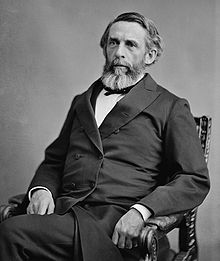George Boutwell | |
|---|---|
 | |
| United States Senator from Massachusetts | |
| In office March 17, 1873 – March 3, 1877 | |
| Preceded by | Henry Wilson |
| Succeeded by | George Hoar |
| 28th United States Secretary of the Treasury | |
| In office March 12, 1869 – March 16, 1873 | |
| President | Ulysses S. Grant |
| Preceded by | Hugh McCulloch |
| Succeeded by | William Richardson |
| Member of the U.S. House of Representatives from Massachusetts's 7th district | |
| In office March 4, 1863 – March 12, 1869 | |
| Preceded by | Daniel W. Gooch |
| Succeeded by | George M. Brooks |
| 1st Commissioner of Internal Revenue | |
| In office July 17, 1862 – March 4, 1863 | |
| President | Abraham Lincoln |
| Preceded by | position established |
| Succeeded by | Joseph J. Lewis |
| 20th Governor of Massachusetts | |
| In office January 11, 1851 – January 14, 1853 | |
| Lieutenant | Henry W. Cushman |
| Preceded by | George N. Briggs |
| Succeeded by | John H. Clifford |
| Personal details | |
| Born | George Sewall Boutwell January 28, 1818 Brookline, Massachusetts, U.S. |
| Died | February 27, 1905 (aged 87) Groton, Massachusetts, U.S. |
| Political party | Democratic (Before 1855) Republican (1855–1898) |
| Spouse | Sarah Thayer |
| Signature | |
George Sewall Boutwell (January 28, 1818 – February 27, 1905) was an American politician, lawyer, and statesman from Massachusetts. He served as Secretary of the Treasury under U.S. President Ulysses S. Grant, the 20th Governor of Massachusetts, a Senator and Representative from Massachusetts and the first Commissioner of Internal Revenue under President Abraham Lincoln. He was a leader in the impeachment of U.S. President Andrew Johnson, and served as a House manager (prosecutor) in the impeachment trial.
Boutwell, an abolitionist, is primarily known for his leadership in the formation of the Republican Party, and his championship of African American citizenship and suffrage rights during Reconstruction. As U.S. Representative, he was instrumental in the construction and passage of the Fourteenth and Fifteenth Amendments to the United States Constitution. As Secretary of Treasury, he made needed reforms in the Treasury Department after the chaos of the American Civil War and the impeachment trial of President Andrew Johnson. He controversially reduced the national debt by selling Treasury gold and using greenbacks to buy up Treasury bonds, a process that created a cash shortage. Boutwell and President Grant thwarted an attempt to corner the gold market in September 1869 by releasing $4,000,000 (~$81.4 million in 2023) of gold into the economy. As U.S. Senator, Boutwell sponsored the Civil Rights Act of 1875 and was chair of a Senate select committee investigating white supremacist violence against Black citizens and their white Republican Party supporters during the 1875 Mississippi state election campaign.
In 1877, President Rutherford B. Hayes appointed Boutwell commissioner to codify the Revised Statutes of the United States and in 1880 to serve as United States counsel before the French and American Claims Commission. He also practiced international law in other diplomatic fora. At the turn of the 20th century, he abandoned the Republican Party, opposed the acquisition of the Philippines, and supported Democrat William Jennings Bryan for president in 1900.